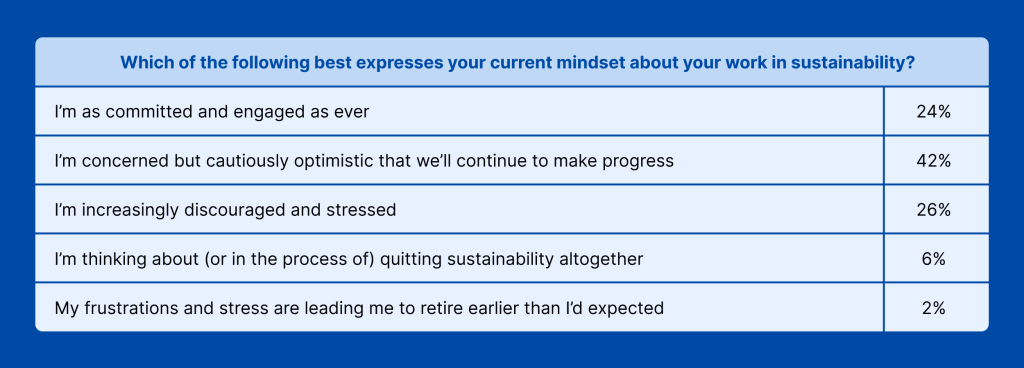In 2024, sustainability professionals were shaken but resolute. The year ahead will be more challenging
Companies are struggling against political headwinds. Will persistence overcome resistance in 2025? Read More

It’s been an interesting year for corporate sustainability professionals. Regulatory mandates, both current and anticipated, have led corporate sustainability departments to focus on reporting and accountability, often detracting from the actual work of improving a company’s sustainability impacts. The political environment, especially in the United States, has led companies to temper, if not quash, their communications on sustainability issues. Budgetary constraints have forced most sustainability departments to, at best, freeze their hiring.

And a succession of announcements has revealed the steep uphill climb companies face in meeting their goals and commitments. A sampling:
- Nike, once a leading light in sustainable innovation laid off or lost nearly a third of its sustainability team, though it professes to be as committed as ever.
- Members of the U.S. Plastics Pact, including Nestlé and Coca-Cola, pushed back deadlines to drastically reduce their use of plastic.
- Fossil-fuel giant Shell walked back its 2030 carbon-reduction goals while Exxon Mobil conceded that its mid-century net-zero goal was essentially out of reach given continued global demand for oil and plastics. BP, for its part, abandoned a target to cut oil and gas output by 2030.
- Emissions from Big Tech climbed sharply, driven by data centers to run energy-intensive artificial intelligence products and services. Microsoft’s carbon emissions are about 30 percent higher today than in 2020. Google’s 2023 emissions were 48 percent higher than in 2019.
The good news
It’s not all bad news. The relentless march of progress continues to improve the efficiency and cost-competitiveness of low-carbon energy, transportation and building technologies. Corporate awareness of the bottom-line impacts of biodiversity loss is blossoming, as are initiatives to stem the tide of destructive practices. Carbon removal technologies, still nascent and controversial, are gaining increased traction — and investment.
And a handful of firms reported significant progress. Apple said it has more than halved its carbon emissions since 2015, despite growing its revenue by roughly two-thirds. Walmart announced it met its goal of reducing, avoiding or sequestering 1 billion metric tons of greenhouse gas emissions from its supply chain six years ahead of schedule.
Gauging optimism
Still, after 2024 sustainability professionals are probably frustrated, exhausted and ready to move on, right?
Not so much.

According to an admittedly unscientific survey I fielded this month (largely via LinkedIn), an overwhelming majority of sustainability professionals report being at least cautiously optimistic about the work they do. But about a third of the more than 650 respondents reported they were “discouraged and stressed” or thinking about quitting sustainability or retiring earlier than expected.
You might expect that older sustainability veterans would be the most discouraged by the underwhelming pace of change. Surprisingly, that wasn’t the case. Those with more than 15 years in the field were most likely to be “as committed and engaged as ever” (31 percent). Youngsters are also undaunted: those with five years or less experience were the ones most “cautiously optimistic that we’ll continue to make progress” (52 percent).
Optimism is largely generational, however. The under-30 crowd reported the highest overall optimism (75 percent, combining “as committed and engaged as ever” and “concerned but cautiously optimistic”) compared to thirty- and fortysomethings (60 and 62 percent, respectively).
Overall, it’s a bullish crowd, which is not totally surprising: As I’ve long stated, sustainability is an inherently optimistic profession, focused on solutions, audacious goals and a better future.
Justice for some
Still, the profession is undergoing consequential changes, which will continue and likely accelerate in 2025. The “anti-woke” backlash has led companies to abandon their diversity goals and generally keep mum about sustainability commitments and achievements. As a result, emboldened rightwing activists are poised to wage new battles — against “justice,” for one: “social justice,” “environmental justice,” “climate justice” and related initiatives are in their sights.
Environmental and social activists are bracing for anticipated funding cuts of “justice”-focused government programs. Companies overtly embracing “justice” could similarly find themselves facing criticism, boycotts, shareholder lawsuits or other forms of retribution from the right. (Or from the left, should they capitulate to those critics.)
But that’s hardly the biggest threat facing advocacy groups, many of which function as allies to companies, providing research, advice and policy support. In November, the U.S. House of Representatives passed a bill that would empower the Treasury Department to eliminate the tax-exempt status of any nonprofit it deems to be supporting terrorism.
That may sound sensible (though federal law already prohibits supporting terrorist activities), but the nonprofit world is rightfully concerned that the proposed law would give expansive power to political parties to restrict what activists and nonprofits can say or do — that is, to silence critics or thwart causes they don’t like.
Companies, of course, are major funders of many nonprofits, which could put them in the crosshairs of lawmakers, activist investors and judges seeking to curtail corporate support. And while the House bill failed in the Senate, that body will soon be under Republican control.
‘Persistence pays off’
All of these forces will no doubt roil corporate sustainability professionals in the year ahead.
So, is all that optimism warranted?
I appreciated many of the more than 200 anonymous comments respondents made to my aforementioned survey, which ran the gamut from raging optimism to glum resignation. But this one stood out, a fitting reminder for the turbulent times ahead:
“It’s important to remember that history shows that societal change often encounters resistance, yet persistence pays off.”
[You’re leading change in an unpredictable environment. Get the strategies you need from the world’s top sustainability leaders at GreenBiz 25, Feb. 10-12, Phoenix.]














